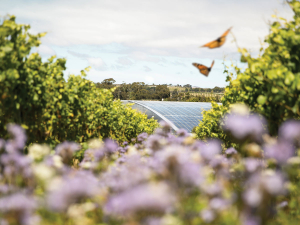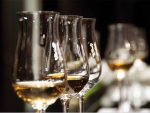Moving Yealands’ goalposts from carbon reduction to carbon elimination required a major change in mindset, says General Manager of Sustainability Michael Wentworth.
It meant thinking less of short-term planning over a financial year and more about “improved” investment over a longer period, adds Michael, who’s long been immersed in the company’s carbon reduction work. “It meant we could invest on a much longer basis to achieve much greater benefit.”
That’s been just one of many learnings since Yealands joined International Wineries for Climate Action (IWCA) in 2020, as the first Kiwi wine company in the global initiative. IWCA, which is certified as part of the United Nations’ Race to Zero campaign, was launched in 2019, by Familia Torres in Spain and Jackson Family Wines in California, to “galvanize the global wine community to create climate change mitigation strategies and decarbonize the industry”.
Yealands was certified carbonzero with Toitū Envirocare from opening day in 2008, followed by ISO 14001 and GC Mark - Green Company certification. Since 2012, the Marlborough wine company has reduced its emission intensity by 34%, thanks to initiatives that include grazing sheep to reduce mowing, the installation of solar panels and wind turbines, and the burning of vine prunings in place of LPG, to provide heat to the winery.
They’re good strides that have earned Yealands plenty of attention and accolades, but the greatest development of plans, “thought processes” and strategies has come from working with IWCA, Michael says.
Yealands has reset its emissions target to be “Carbon Positive” by 2050, with a 50% reduction to be achieved by 2030. “With that came a shift,” says Michael, noting a transition from focussing on reducing scope 1 and 2 emissions, by tackling electricity and diesel use, to a greater focus on what happens to the wine after it is made, with scope 3 emissions including packaging and freight. Michael says approximately 80% of the company’s emissions come from scope 3, “so anything we can do in that space is going to be really beneficial for us long term”. It takes “a much broader, longer-term view to address those challenges, and ideally an industry wide approach”, Michael adds.
Speaking in the recent New Zealand Winegrowers Tackling Climate Change webinar series, Michael said the IWCA had four specific areas of focus, beginning with “raising awareness around the need to do something”.
The second is sharing strategies for best practice, which is probably the largest benefit across the organisation, “because you have 36 wineries sitting in the same room with their own sustainability journeys, all with their own learnings and many experiencing the same challenges as yourselves,” says Michael. “We have found it an awesome opportunity to discuss common problems and ultimately work on solutions.”
The third area is in adopting a sciencebased approach to mitigating climate change, and the fourth is in measurement, which has been “absolutely key”, says Michael, noting that measurement tools have to be accessible to wineries of all scales, sizes and resourcing levels.
Earlier this year Felton Road became the second New Zealand member and Michael, who is on the IWCA board, says three other Kiwi companies are in talks with the organisation.
He hopes to see more companies join the fold, talking of the need for economies of scale. “The more New Zealand wineries we can encourage to participate in terms of IWCA, the greater difference we can make across the board.”
Felton Road
The IWCA's target of being carbon neutral by 2050 has strict parameters, with thirdparty verification of the three greenhouse gas scopes – scope 1 being direct emissions from owned or controlled sources, scope 2 indirect emissions from purchased energy and scope 3 all other indirect emissions in the value chain. “Suddenly you realise that’s a challenge,” says Felton Road owner Nigel Greening, who signed up his Central Otago wine company to the IWCA earlier this year. “That’s what I love - they are on my wavelength.”












